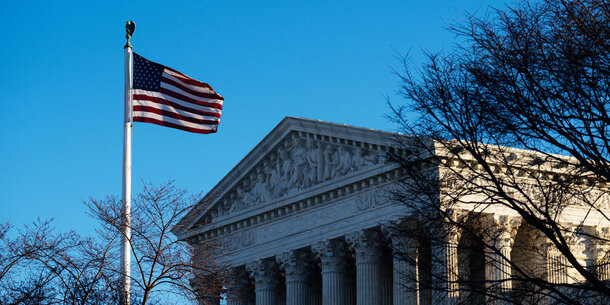You’re reading The Briefing, Michael Waldman’s weekly newsletter. Click here to receive it in your inbox.
We are on day 29 of a government shutdown with no end in sight. The House of Representatives barely works. And essential SNAP food assistance funds will run out on Saturday.
Gaze at Washington, DC, and you will see division and extremism. Look more widely around the country, though, and it is possible to feel something like . . . optimism?
This year, many states are proving to be a check against abuse and overreach by the federal government. Governors and attorneys general have fought fiercely against unconstitutional measures such as the effort to end birthright citizenship. This week, 25 states sued to stop the federal government from cutting off food aid.
Right now, states are resisting the epic power grab by the White House. But that is not all.
Even more so, they are testing grounds, places where new thinking can grow. Justice Louis Brandeis famously called states laboratories of experimentation. Congress may be stymied by filibusters in addressing money in politics, for example, but New York State is fully implementing its new rules in next year’s elections for state offices. That system provides matching funds for small contributions and has already democratized who gives — and thus who gets — special attention from lawmakers. It is the nation’s most significant response to Citizens United to date.
At the Brennan Center, we have two initiatives that aim to tap the creativity and potential of state policymakers and legal systems.
State courts are independent from the federal courts and stand as a bulwark to protect rights and promote equality. State constitutions offer robust protections. For instance, 49 of 50 states have in their constitution an affirmative right to vote. State charters offer avenues to address climate change, protect the rights of criminal defendants, and much more.
On November 6 and 7, the Brennan Center will host a conference with the Northwestern University Law Review in Chicago. The Power of State Constitutional Rights will feature judges, scholars, litigators, and advocates in conversation about how citizens are using state courts to advance voting rights and fair legislative districts, LGBTQ+ rights, and other topics. Experts will discuss “unique rights,” which only state constitutions protect. For example, natural rights articulated centuries ago by John Locke are enforceable in many states — you know, life, liberty, and the pursuit of happiness, that kind of thing. Many states have Equal Rights Amendments to guarantee equality for women. State constitutions protect the environment too. All these can expand our constitutional imagination as we contemplate a U.S. charter that has not been amended in 33 years.
Last year, we held a similar conference at NYU that drew 300 people over three days and was covered in The New Yorker. We also cover state constitutional developments through State Court Report, a unique publication that provides commentary and analysis about cases and legal trends. We aim to kindle a movement that reaches across states, issues, and ideological lines. In Chicago, the keynote speaker will be Jeffrey S. Sutton, the chief judge of the U.S. Court of Appeals for the Sixth Circuit and an expert on state constitutional law. He has written, “American federalism, like breathing, often happens without our noticing it.”
Another event this week launched a new initiative, our Partnership for Southern Impact. We are teaming up with Fisk University, one of the country’s most storied historically Black colleges and universities (HBCUs) and the oldest institution of higher learning in Nashville, Tennessee. This work is centered at the John Lewis Center for Social Justice, named for one of Fisk’s most important graduates.
The South is a region of particular promise and peril. It is the fastest-growing region, with growth coming overwhelmingly from communities of color. It is economically dynamic, seeing the establishment of new businesses of all sizes. Yet it is also the most stubbornly gerrymandered, with some of the highest markers of voter suppression and with the largest share of its population incarcerated. The future of the South, in short, will shape the nation’s future.
State legislators often struggle to develop policies on all these topics, with few staff resources and little access to research. So we are making our social scientists, lawyers, and communications specialists available to help identify solutions and turn new ideas into specific reform policies.
The Partnership for Southern Impact kicked off this week with a gathering of legislators, journalists, academics, and advocates in Nashville. We examined key policies that will shape the agenda in Southern state legislatures. Lauren-Brooke Eisen, who leads the Brennan Center’s criminal justice work, moderated a panel on prison conditions, a key focus as states emerge as promising venues for reform. Panels addressed voting rights and elections to demonstrate how states can protect election systems against new threats and address a national rush to conduct mid-decade redistricting. And Kareem Crayton, who leads the Partnership, engaged with caucus leaders in a roundtable on effective governance strategies. One key insight: Bipartisan compromise is still possible, even in legislatures with supermajorities.
It’s important not to fetishize federalism. Often there is no substitute for national action and national standards. Indeed, history teaches that strong federal laws enforced by federal courts can be the remedy when states abuse the rights of their own people. And the growing polarization between the social and political systems of red and blue states portends new divisions.
But at a time when national politics can veer between energetic authoritarianism and an opposition with a threadbare agenda, the ferment in the states can be refreshing — the start of a new politics. In the courts and in the legislatures, we can see the germination of new thinking and new approaches that can sweep the country and become national law.



